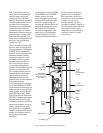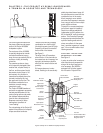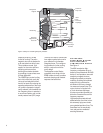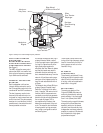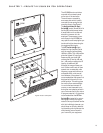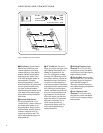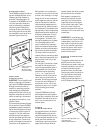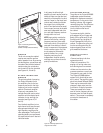
CHAPTER 9 – TROUBLESHOOTING AND SERVICE GUIDE
Project K2 S5800 loudspeakers
are designed to provide years of
trouble-free service.
If you are experiencing difficul-
ties, we suggest you check these
possibilities before contacting
your
Project K2 specialist dealer
for assistance.
IF THERE IS NO SOUND
FROM ANY OF THE
SPEAKERS:
• Check that the receiver/amplifier
is on and a source is playing.
• Check all wires and connections
between the receiver/amplifier
and the speakers. Make sure all
wires are connected, and are
not frayed, cut or punctured. No
wires or strands should be touching
each other or the shorting bars
connected to other terminals.
• Review proper operation of your
receiver/amplifier.
IF THERE IS NO SOUND
COMING FROM ONE
SPEAKER:
• Check the “Balance” control on
your receiver/processor.
• Check all wires and connections
between the receiver/amplifier
and the speakers. Make sure all
wires are connected, and are not
frayed, cut or punctured. No
wires
or strands should be touching
each
other or the shorting bars con-
nected to other terminals.
• In digital surround sound modes,
make sure that the receiver/
processor is configured so that
the speaker in question is
enabled.
• Switch the speaker wires
between the speaker with the
problem and one that is working
correctly. If the problem remains
in the same speaker, then the
fault is in the loudspeaker. In
this event, consult your
Project
K2 S5800 specialist dealer for
assistance. If, however, the
problem has moved to the other
speaker, then the cause is in
either a cable or an electronic
component.
IF THE SYSTEM PLAYS
AT LOW VOLUMES BUT
SHUTS OFF AS VOLUME
IS INCREASED:
• Check all wires and connections
between the receiver/amplifier
and the speakers. Make sure all
wires are connected, and are not
frayed, cut or punctured. No
wires
or strands should be touching
each
other or the shorting bars con-
nected to other terminals.
• If more than one pair of main
speakers is being used, check the
minimum impedance require-
ments of your receiver/amplifier.
IF THERE IS LOW (OR
NO) BASS OUTPUT:
• Make sure the connections to
the left and right speaker termi-
nals have the correct polarity.
• In digital surround modes,
consider adding a powered
subwoofer to play the LFE (low-
frequency effects) channel of
the program.
IF THE SPEAKERS
SOUND QUALITATIVELY
DIFFERENT IN AN
INDEFINABLE WAY:
• Test the batteries and replace
them if necessary.
NOTE: The batteries should be
tested once a year in any event.
18



